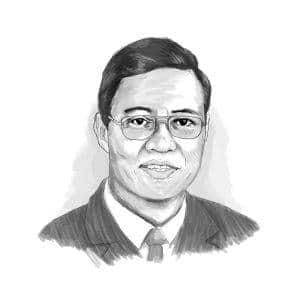WORD ALIVE

“How hard it is for a rich man to enter the Kingdom of God. It is easier for a camel to pass through the eye of a needle than for a rich man to enter the Kingdom of God” (Mk 10,25).
The words of Jesus sounds shocking and threatening for the rich. What does the Lord mean? Does he mean that the affluent are almost impossible to enter the Kingdom of God? On the other hand, are the poor necessarily privileged to enter his Kingdom?
A witty man once said: “People say, ‘Money is the root of all evils,’ but they are always welcome to plant it in my garden anytime.” He is saying that money is not necessarily bad.
Jesus himself enjoyed the food, the parties and company offered by rich people like Zaccheus, the tax collector, Joseph of Arimathea who lent his tomb to Jesus, Nicodemus, ruler of the Jews (Jn 3,3).
With money you can do a lot of good like putting up low-cost housing or employ the jobless in your company, in short, help the less fortunate.
But with money you can do a lot of evil. You can bribe people, buy votes (elections are coming again!), buy and market illegal drugs, influence judges’ decisions, and so on.
So, money is good or bad according to how you use it. It depends on your way of thinking and attitude. If there’s a will there’s always a way to do what’s good but also evil.
The danger of being rich – and this is what Jesus warns against – is the excessive attachment to wealth and the selfish pleasures that go with it.
This is shown on tomorrow’s gospel episode (Mk 10,17) where the rich young man went away sad because he couldn't give up his possessions in order to follow Christ.
What's censured is not wealth in itself but the reversal of values, that is, instead of man possessing his riches, he becomes possessed by them.
* * *
To illustrate: A businessman who resigned as president of a company has this observation: “There's one corporation chief I had who worked conservatively 19-20 hours a day. His whole life was his business. And he demanded the same of his executives.
“Meetings might be called on Christmas or New Year’s Day, on Saturdays or Sundays. One day the slave-driving boss was found slumped on his office table – a victim of heart attack!
Poor guy, he ended a servant, not of people, but of money.
* * *
On the reverse side, poverty is not necessarily a virtue. A poor man who curses his lot, whose sole obsession in life is to be as rich as his wealthy neighbor by illegal means is very poor, indeed. But if, despite poverty, one can turn to God and help his fellowmen, then poverty is a Christian virtue.
* * *
Thus, Jesus reminds us in today’s gospel that we have a social and Christian obligation if we want to enter Heaven. He tells the rich young man: “Go and sell what you have and give to the poor; you will then have treasure in Heaven” (Mk 10,21).
There are many people living in grinding poverty. Live simply and share so others may simply live.
* * *
Thoughts to ponder. Three kids are bragging to each other. The first says, “Our house is worth ₱20 million.” The second countered, “Our garage alone costs ₱15 million.” The third says nonchalantly, “That’s nothing. The roof of our house is worth ₱500 million.” The two kids were dumbfounded. “Ha, why so expensive?” He replies: “Our roof is the flyover!”
A man says: “What scares me most is when God says to Saint Mother Teresa on Judgment Day, ‘Teresa, you should have done more good works.’
And there I am – right behind her!”
The Lord said, “Whatever you did to the least of My brethren, you did it for Me” (Mt. 25,40).
* * *
Appeal. Our seminarians have enrolled for the new school year. They need financial assistance. Let’s remember how important our future priests are in the Church. Without them, we cannot have ordained ministers to dispense the sacraments of the Holy Mass, baptism, confession, and become SVD missionaries.
Donate any amount or sponsor a seminarian's schooling good for one school year.
(Email: [email protected])